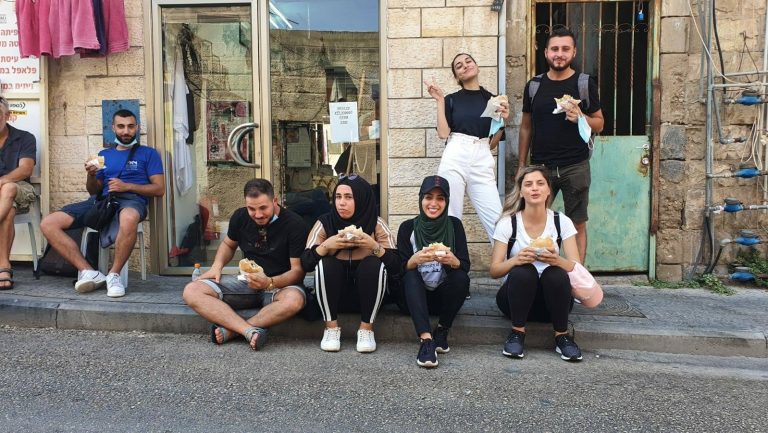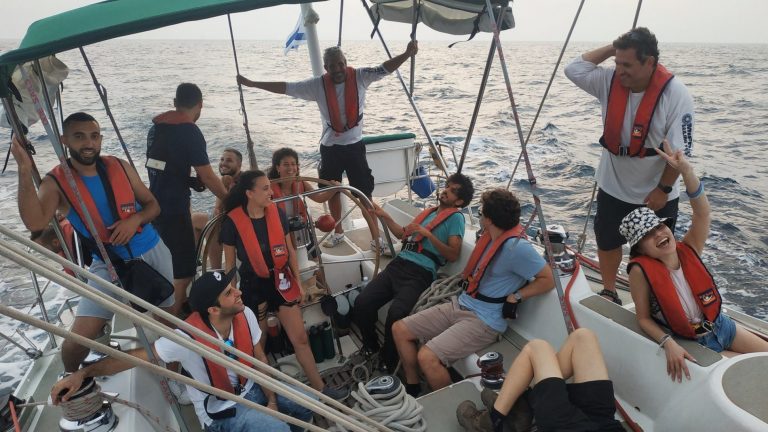Last month, we started a new tradition. After 12 years in action, we decided to check in with our alumni, and to see where they are now and what they’re up to. Even though we always knew they’d go far, we didn’t know just how far. So, take a minute and get to know four of our exceptionally successful alumni.
Lian Najami
Lian has made history. She is the first Arab citizen of Israel to be awarded a Rhodes Scholarship. As a Rhodes Scholar, Lian is currently at Oxford University, completing her Master’s Degree in comparative social policy, and next year she will start an additional master’s in public policy. While we are talking about the honor of becoming a Rhodes Scholar, she immediately says, “It doesn’t mean anything that I am the first [Arab Rhodes Scholar from Israel], if another one doesn’t come after me.”
Lian takes means this with all seriousness, and I not just paying lip service. Actually, she founded Almanara Resources and Peaceful Infusions, two social initiatives to promote employment among Arab women in Israel through academic scholarships, job training, and by helping women generate their own income.

Lian spent two years in our Arab-Jewish Community Leadership program at the University of Haifa, and last year, she joined Mabat’s board of directors, taking charge of Mabat’s growing alumni programs. When we ask her about her experience in the program, she says nostalgically, “The program itself really made space for me. I felt like I could express myself freely, and the facilitators led us on a gradual journey from shallow waters to deeper and more significant conversations. The friendships that developed that developed through the program were founded upon common values and on the belief in a shared existence were very significant for me, and some of them are still a part of me today. Another part was the exposure to a variety of opinions among my Arab peers. As someone who grew up in Haifa, where there a specific type of consensus among Arab residents, I was unware of the wide range [in perspectives]. I tried to understand why the differences are so deep, and what causes them. That stays with me till today.
Yael Bolt

Yael received a university scholarship for her participation in Mabat’s Arab-Jewish Community Leadership program at University of Haifa in 2013, while she completed her master’s degree in organizational consulting.
“As far as I am concerned, this was the only platform where I could hold direct dialogue with Arab society. I didn’t get this opportunity in any other framework. In contrast to the rest of my experience at the university, where I felt a separation from the Arabic-speaking students, here I found an intersection of narratives, and very high-level discussions. The workshops themselves were also of a very high caliber.” To hear this from Yael, who has been leading groups since she was 15, is a major compliment.
Today, I am learning psychodynamic group facilitation. I am self-employed, facilitating groups in all sorts of fields: leadership development, cultural orientation and social integration for immigrants (I myself emigrated to Israel in 2006). In the past decade I worked with immigrant students through the Immigration and Absorption Ministry. I started out mentoring immigrant students at the University of Haifa. Ultimately, I managed the national programs for student immigrants for all of the immigrant students in Israel (approximately 6,500 in total). The program is comprehensive, helping on a social level and on an academic level.
Ismael Abu Freh

Ismael is an alumnus of the Arab-Jewish Community Leadership Program at the University of Haifa, where is earned his bachelors’ degree in speech therapy. In fact, Ismael is the first Bedouin to complete the speech therapy program at the University of Haifa, earning a Bachelors and Masters there.
“I went to study this field, because I was a child with speech and hearing problems, and I know the great importance for a speech therapist to have sensitivity and cultural awareness. As a speech therapist, especially in a diverse country like Israel, it’s very important to learn each patient’s story and cultural background.
“I remember the [Mabat] program as being very special,” he says. “The diversity ingrained in the program – every participant came from a different background. It was very important for me to present the topic of the unrecognized Bedouin villages. Most of the participants weren’t familiar with the topic, which I care about personally, as someone who grew up in [the Bedouin town of] Rahat. The reactions I got were very understanding and supportive, and they were really interested in my story and that of the villages. Through the program, I got a lot of tools for managing discussions on conflict issues, and to this day, I sometimes uses these tools with my colleagues at work.
Hagit Krakov

Hagit talks about her time with Mabat: “It was a very significant and enriching experience for me. I received a scholarship to take place in the dialogue program at Kinneret college in 2009. As part of the program, I was lucky enough to take part in very special and interesting programs on the topics of coexistence and Jerusalem. The discourse was very open, and it brought people together. We did many activities together, and I formed many friendships in the group. At the end, we even put together a much talked about event with [musician] Ehud Banai and [media personality] Haim Hecht, and that stays with me as a crazy experience.”
Even then, it was clear that Hagit came to do bigger things in the world, and very quickly, that became the reality. I’ve been working for [Israel’s international development organization] IsraAID for more than four years. I started there in 2015, and then I led an emergency delegation to Manawatu-Wanganui, an island nation next to New Zealand, which was heavily damaged by a tornado. I ended up staying for nearly a year. We started programs to help residents’ psychological and social circumstances, as well as a program to make water more readily available. These are programs that continue running through Israeli representatives until today.
From there, I continued to take part in various emergency programs. One of the most significant for me was in Greece in 2016 with refugees from Iraq and Afghanistan. In my last position at IsraAID, I was as one of three people managing the IsraAID headquarters in Israel, through which I led IsraAID mission directors in the Middle East and Europe, until I went on maternity leave, and planned a move to London. Due to Covid-19, that move has been put on hold for the moment, and I have since returned to IsraAID, to manage our amazing local projects helping refugees in Israel. Right now, we are developing programs to help refugees build resilience and gain tools for dealing with crises, and I very much hope that it will continue.”
—
We are very proud of our talented alumni, and wish them great success in their future endeavors.





